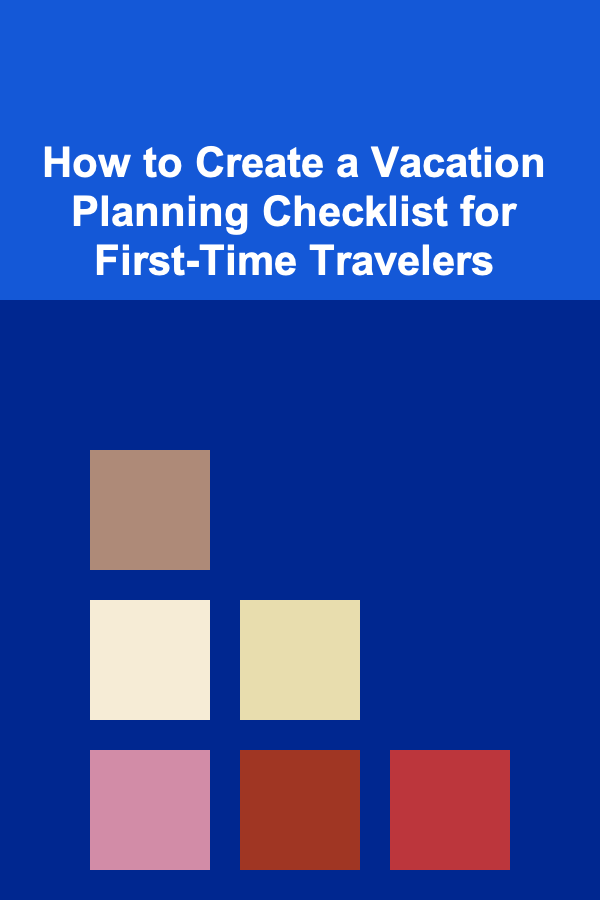
How to Create a Vacation Planning Checklist for First-Time Travelers
ebook include PDF & Audio bundle (Micro Guide)
$12.99$7.99
Limited Time Offer! Order within the next:

Planning your first vacation can be a thrilling experience, but it can also be overwhelming. There's so much to think about: where to go, how to get there, where to stay, and what to pack. A well-organized checklist can make the process smoother, ensuring that you don't miss any crucial steps. In this guide, we'll break down everything you need to do to create a comprehensive vacation planning checklist, tailored specifically for first-time travelers.
Step 1: Set Your Vacation Goals
Before diving into the details, it's important to understand the purpose of your vacation. What are you hoping to achieve with this trip? Is it to relax on a beach, explore a new culture, or embark on an adventure? By setting clear goals, you can tailor your entire planning process to fit your expectations.
Key Questions to Ask Yourself:
- What type of vacation are you looking for? (relaxation, adventure, cultural immersion, etc.)
- What kind of experience do you want? (luxury, budget, family-friendly, solo)
- What destinations appeal to you? (beaches, mountains, cities, historical sites)
Step 2: Choose Your Destination
Once you know what kind of vacation you're aiming for, choosing the right destination becomes much easier. Research different destinations based on your interests and budget. For first-time travelers, it's important to consider factors like safety, accessibility, and the level of infrastructure in place to support tourists.
Tips for Choosing Your Destination:
- Consider travel advisories and safety concerns. Ensure that the location is safe for tourists.
- Evaluate the climate. Check the weather for the time of year you plan to travel.
- Look into visa requirements. Some destinations may require a visa, while others may offer visa-on-arrival services.
- Consider flight availability. A location that's well-served by international flights will be more convenient.
Step 3: Research Accommodations
Once you've selected your destination, the next step is to find accommodation. The right place to stay can make or break your vacation experience, so it's essential to choose wisely.
Types of Accommodation to Consider:
- Hotels: Often the most convenient and widely available option.
- Airbnb/Short-term Rentals: Ideal for a more personalized or homely experience.
- Hostels: Great for budget travelers or those seeking to meet other people.
- Resorts: Perfect for those looking for an all-inclusive experience.
- Guesthouses/B&Bs: Great for a more intimate or local experience.
Tips for Booking Accommodation:
- Read reviews on trusted platforms. Websites like TripAdvisor, Booking.com, and Airbnb offer user reviews that give valuable insights into the quality of the accommodation.
- Check cancellation policies. This can be crucial if your plans change unexpectedly.
- Location matters. Choose accommodations that are close to your key activities, especially if you're unfamiliar with the area.
Step 4: Plan Your Budget
Setting a realistic budget is key to planning a successful vacation. This includes all aspects of your trip: flights, accommodation, meals, activities, transportation, and even unexpected expenses. A well-thought-out budget will help you avoid overspending and make your trip stress-free.
Components of Your Travel Budget:
- Flights/transportation: Include both the cost of getting to your destination and any internal transportation costs (trains, buses, taxis).
- Accommodation: Factor in the total cost for the duration of your stay.
- Food: Estimate your daily food costs, considering whether you'll be eating at restaurants or cooking your own meals.
- Activities/Excursions: Research activities you'd like to do and their associated costs.
- Travel Insurance: Highly recommended for first-time travelers to cover potential medical emergencies or trip cancellations.
- Souvenirs/Shopping: It's easy to forget these, but setting aside some money for souvenirs is a good idea.
Tips for Staying on Budget:
- Look for package deals. Some airlines, hotels, and tours offer bundle packages that may save you money.
- Use travel apps for budgeting. Apps like Mint or Trail Wallet help you track expenses during your trip.
- Set aside an emergency fund. This is crucial in case of unexpected expenses.
Step 5: Book Flights
Booking your flight is one of the most important steps, as it determines how you'll get to your destination. For first-time travelers, finding the best flight deals and knowing when to book can be a challenge.
Tips for Booking Flights:
- Use flight comparison websites. Websites like Skyscanner, Google Flights, and Kayak allow you to compare prices from different airlines and find the best deal.
- Consider flexible dates. Airfare can fluctuate depending on the day of the week, time of day, and season. If your travel dates are flexible, you might be able to save money.
- Book in advance. For international flights, booking at least 3-6 months in advance often results in lower prices.
Step 6: Pack Smart
Packing for a vacation can feel daunting, especially if you're not sure what to bring. As a first-time traveler, it's crucial to pack light and only take what you really need. Packing too much can lead to heavy luggage, extra fees, and unnecessary stress.
Essential Items to Pack:
- Travel documents: Passport, visa (if required), travel insurance, flight tickets, hotel reservations, and emergency contact details.
- Clothing: Pack according to the climate of your destination. Include versatile clothing that can be mixed and matched.
- Toiletries: Travel-size shampoo, toothpaste, and other essential toiletries. Many airlines have restrictions on liquids, so be sure to check.
- Medications and first aid kit: Bring any prescription medications, as well as over-the-counter remedies for headaches, stomach issues, and colds.
- Electronics: Don't forget your phone, camera, chargers, and any other electronics you'll need.
- Money: Bring both local currency (if necessary) and a credit card. It's also smart to carry a little extra cash in case of emergencies.
Packing Tips:
- Use packing cubes. These help you stay organized and maximize space in your suitcase.
- Roll your clothes. This technique can save space and reduce wrinkles.
- Check airline baggage policies. Make sure your luggage meets weight and size requirements to avoid extra fees.
Step 7: Prepare for Travel Safety
Ensuring your safety while traveling is paramount. As a first-time traveler, it's important to take precautions to avoid common risks.
Safety Tips for First-Time Travelers:
- Register with your embassy. Some countries allow you to register your trip with the embassy, making it easier for them to assist you in case of an emergency.
- Stay aware of local customs and laws. Research any cultural differences or local laws you should be aware of to avoid misunderstandings.
- Secure your valuables. Use a hotel safe to store important documents and money. When out, consider using a money belt or neck pouch.
- Learn basic local phrases. Learn a few key phrases in the local language (e.g., "hello," "thank you," "bathroom") to make communication easier.
Step 8: Stay Healthy While Traveling
Maintaining your health while traveling is crucial to enjoying your trip. There are some key practices you can adopt to stay fit and safe while abroad.
Health Tips for Travelers:
- Stay hydrated. Dehydration can ruin your vacation, especially when traveling to hot climates.
- Eat healthily. Be mindful of what you eat, particularly when trying new foods. Avoid street food if you have a sensitive stomach.
- Exercise. Consider light activities like walking, swimming, or yoga to keep your body in balance during the trip.
- Get the right vaccinations. Depending on your destination, certain vaccinations may be required or recommended.
Conclusion
Planning a vacation as a first-time traveler might seem like a daunting task, but with a clear checklist, the process becomes more manageable. By following these steps---setting goals, choosing a destination, researching accommodations, budgeting, booking flights, packing smart, and staying safe---you'll be well on your way to a successful and memorable trip. The key is to stay organized and plan ahead, ensuring that your vacation is stress-free and enjoyable from start to finish.
Other Products

How to Celebrate Your Achievements in Your Home Office
Read More
How to Get Rid of Pet Hair from Every Surface
Read More
How to Maintain Outdoor Appliances Like Grills
Read More
How to Make Money Online as a House Sitter: 10 Actionable Ideas
Read More
How to Organize a Stress-Free Home Party
Read More